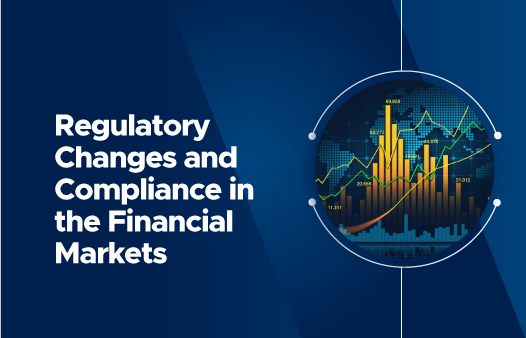Regulatory changes and compliance in the financial markets
Have you ever thought of why the financial market needs regulations? It is to prevent and investigate fraud or crisis, keep the financial market efficient and transparent and ensure customers and clients are served honestly and fairly. The financial systems in India pay attention to the regulatory frameworks in sectors including the banking sector, insurance institutions, capital markets, and pension regulations. The Indian government has an important role in providing financial safety and roles for regulators.
Financial regulation: What do you know?
It refers to the rules and firms operating in the finance industry including banks, credit unions, insurance companies, and financial brokers. These regulations are about having rules which are helpful to overlook and enforce. Most laws governing the financial systems are important to strengthen and issue guidance during the financial crisis.
For instance, businesses, consumers and individuals have a direct connection with the financial institutions to borrow, save, claim or mortgage. Therefore, it is necessary to have regulated financial institutions which safeguard the financial systems and consumers if any issues arise.
Who are the financial regulators in India?
To maintain the stability, integrity, and equitable function of financial markets and institutions, financial regulators are either governmental or non-profit organizations. They create regulations and hold control across various components of the financial industry. The prime goal of these regulations is
- Stability: It means safeguarding and improving the country’s financial stability.
- Protecting the consumers: Safeguarding the consumers in terms of getting legal mortgages and Claims.
- Market: Financial regulators need to maintain confidence in the financial system.
- Financial fraud or crisis: It is significant to lessen the possibility of companies or organizations turning into a victim of financial fraud or crimes.
Let’s discuss the financial regulation based on the following financial law and its practices.
SEBI- Securities and Exchange Board of India is the market regulator in the Indian capital market. This regulator holds the responsibility in protecting the investors when there is a raise of malpractices in the capital market in the form of insider trading, and regulations for registering brokers, and investment bankers, supervises stock exchanges, and conducts audits and inquiries to spot the wrongdoings.
IRDA- Insurance Regulatory and Development Authority regulator for the insurance sector that maintains and updates the regulations and has strict governance over insurance pricing. This also holds the control over insurance premium rates, terms and conditions for the insurers and benefits offered to an insurer needs approval from IRDA.
RBI- Reserve Bank of India for monetary policy. The prime responsibility is to have stability in the economy and control credit flow in the various sectors. RBI has a great influence even on the commercial banks and non-banking financial sector. The operations involve money circulation, regulating payments and settlements, deciding interest rates, managing foreign exchange, and controlling interest rates which affect market liquidity.
PFRDA- Pension Funds Regulatory and Development Authority regulates pensions for all Indian citizens including non-resident Indians. This regulation focuses on generating pension fund guidelines and securing pensions for senior citizens.
MCA- Ministry of Corporate Affairs for the corporate sector with the objective to help the growth of companies. It has its hands on authorizing company registrations and functions as per regulations.
How to improve financial compliance in organizations?
Enforcing regulatory compliance with training and development, accessibility to compliance is crucial. Sometimes employees may need to refer to compliance before taking up any financial crisis.
The ease of communication between front-line staff and the compliance department needs to be improved within organizations. Regulatory compliance is more efficient department in an organization where employees can easily consult about the regulations or when assistance is required.
One of the biggest barriers to enhancing regulatory compliance is its invisible nature. Issues arise too slowly for organisations to identify at the outset; instead, they are discovered months later during an audit.
Conclusion:
Regulatory compliance for financial institutions compiles based on the core problems in the field where it receives the recommendations on digital transformation with focus on data quality. This advancements in regulatory compliance lowers the risks and enhance the financial services compliance.
It is evident that financial firms need to implement a new strategy to effectively address the compliance issues brought about by regulatory reform. Students pursuing an in MBA finance colleges in Tamil Nadu should know the regulations and compliance in the financial services sector, how to manage the issues from regulatory changes with the digital transformation and fresh opportunities for regulatory compliance to generate value for the business.



